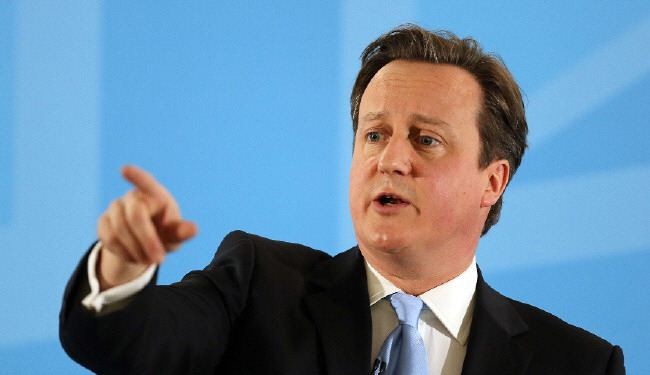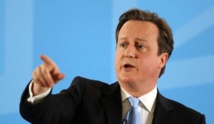Underlining Cameron's pledge to beef up European defence capability, he also said Britain would put into service a second aircraft carrier, The Prince of Wales, which the government had previously considered selling or holding in reserve due to budget constraints.
"As Russia tramples illegally over Ukraine, we must reassure our Eastern European members that we will always uphold our Article 5 commitments," Cameron told the second day of a NATO summit in Wales.
To do that, NATO "must be able to act more quickly," he said, hoping that the 28 allies would agree to set up a "spearhead force deployable anywhere in the world in just two to five days."
This spearhead would be part of a reformed NATO Response Force headquartered in Poland, with pre-positioned equipment and exercising frequently to ensure its readiness.
"If we can agree this, the UK will contribute 3,500 personnel" to this overall force, he added.
Cameron's spokesman said Britain would separately provide some 1,000 troops to the spearhead element out of the planned 4,000.
On the second aircraft carrier, due to be brought into full service from 2023, Cameron said: "They are an investment in British security, British prosperity and our place in the world, transforming our ability to project power globally, whether independently or with our allies."
The Prince of Wales and its sister ship the Queen Elizabeth, to which Britain's Queen Elizabeth II officially gave her name last month at a ceremony in Scotland, are being built at a cost of £6.2 billion ($10.1 billion, 7.8 billion euros) to overhaul Britain's naval capabilities.
Addressing a spate of crises around the world, the two-day NATO summit has been billed as the most important since the end of the Cold War.
The rapid reaction force is meant to reassure former Soviet satellites such as Poland and the Baltic states that fear an emboldened Russia will turn its sights on them. It is also aimed at new threats, especially in a volatile Middle East.
-------------------------------------------------------------------------------------
"As Russia tramples illegally over Ukraine, we must reassure our Eastern European members that we will always uphold our Article 5 commitments," Cameron told the second day of a NATO summit in Wales.
To do that, NATO "must be able to act more quickly," he said, hoping that the 28 allies would agree to set up a "spearhead force deployable anywhere in the world in just two to five days."
This spearhead would be part of a reformed NATO Response Force headquartered in Poland, with pre-positioned equipment and exercising frequently to ensure its readiness.
"If we can agree this, the UK will contribute 3,500 personnel" to this overall force, he added.
Cameron's spokesman said Britain would separately provide some 1,000 troops to the spearhead element out of the planned 4,000.
On the second aircraft carrier, due to be brought into full service from 2023, Cameron said: "They are an investment in British security, British prosperity and our place in the world, transforming our ability to project power globally, whether independently or with our allies."
The Prince of Wales and its sister ship the Queen Elizabeth, to which Britain's Queen Elizabeth II officially gave her name last month at a ceremony in Scotland, are being built at a cost of £6.2 billion ($10.1 billion, 7.8 billion euros) to overhaul Britain's naval capabilities.
Addressing a spate of crises around the world, the two-day NATO summit has been billed as the most important since the end of the Cold War.
The rapid reaction force is meant to reassure former Soviet satellites such as Poland and the Baltic states that fear an emboldened Russia will turn its sights on them. It is also aimed at new threats, especially in a volatile Middle East.
-------------------------------------------------------------------------------------









 Home
Home Politics
Politics











